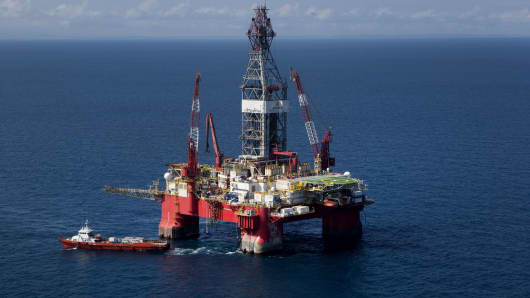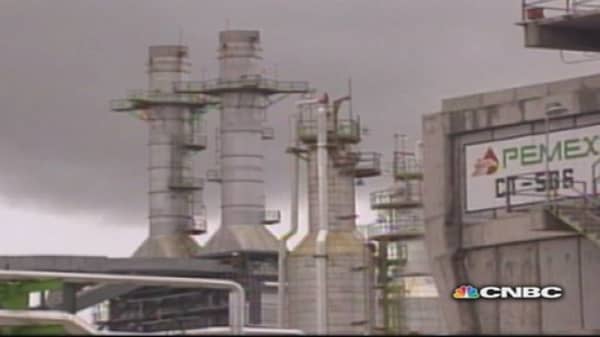In the decades since, Pemex has been the sole operator of the oil industry. It is one of the largest oil companies in the world, and is one of the major suppliers of oil imports to the United States.
(Read more: Mexican energy reform: Here are the winners)
But now it is the current PRI president, Pena Nieto, who wants to reverse the 75-year-old decision of the PRI's revered Cardenas. The reasons are clear: Pemex can no longer go it alone. And the Mexican state can no longer take the risk and absorb the vulnerability of being directly in the oil business.
The numbers tell the story: Despite a decade of rising oil prices, Mexico's oil output has declined by 30 percent — to 2.5 million barrels per day from 3.5 million. Its imports of natural gas from the United States have risen to a third of total consumption. Mexico has not been able to develop its share of the deep water Gulf of Mexico, in contrast to the U.S. side, which produces 1.3 million barrels per day in federal waters.
(Read more: Fed taper could be good for Mexico: Carstens)
Mexico has very good prospects for shale gas and tight oil, which have provided the big increases in U.S. energy output in the last few years. Indeed, the prolific Eagle Ford formation in South Texas does not end at the border; it extends into Mexico.
But developing these new resources would take tens and tens of billions of dollars that Pemex does not have and will not have. Declining production puts the government at risk, as revenues from Pemex provide about 35 percent of the national budget. Depending on Pemex alone to develop these resources, as officials point out, means that the government is carrying the "exploration and development" risk. That's what private companies are set up to do, not governments. In addition, bringing in foreign companies to work side by side with Pemex would lift Pemex' game and help squeeze inefficiency out of its operations.
Moreover, increasing domestic oil and gas production would mean more government revenues for spending on education and social needs. After all, the government, as is customary, will take most of the profit on new production in the form of taxes and royalties.
This reform is crucial to providing the energy supplies that a growing Mexican economy will require. Many global manufacturers are locating plants in Mexico because of the rising skill level of its work force and its proximity to the U.S. market. But it is also becoming a global manufacturing center; Nissan's CEO announced a couple of weeks ago that Mexico will soon overtake Japan as an export platform for Nissan.
All of this is very persuasive to the PRI party and the right-wing PAN party. But not to the left-wing PRD, which sees itself as the spiritual heir to Lazaro Cardenas, and which is determined to fight the reform. Any opening to private companies, it warns, would be a "historic defeat" for Mexico.
The specific issue goes back to the "subsoil" of 1917. Will international companies be able to share in ownership of what they find and book reserves, which is one of the main things that investors use to judge them? Or will they merely be contractors, making profits but with no ownership? If it is the latter, the interest on the part of companies will be much more tepid. They need additional reserves to support their stock-market valuations.
At this point, it looks like a positive, though split, decision. In the less-risky shallow waters of the Gulf of Mexico, the companies would get a share of profits, but no ownership. For the deep waters of the Gulf and for shale gas and tight oil, they would have production-sharing contracts, which would also enable them to book a share of reserves. That would do a great deal to attract those tens of billions of dollars of additional investment, as well as the technology that Mexico needs.
But expect a bitter battle to the end — led by the PRD and the left — both in the Congress and on the streets. For, in trying to move Mexico onto a sensible course for the 21st century, President Pena Nieto is also wrestling with a passionate, if outdated, legacy from the early years of the 20th century.
(Read more: Why the US is a hot commodity right now: Yergin)
— By Daniel Yergin
Daniel Yergin is vice chairman of IHS and a Pulitzer Prize-winning author. His latest book is "The Quest: Energy, Security, and the Remaking of the Modern World." Follow him on Twitter @danielyergin.




